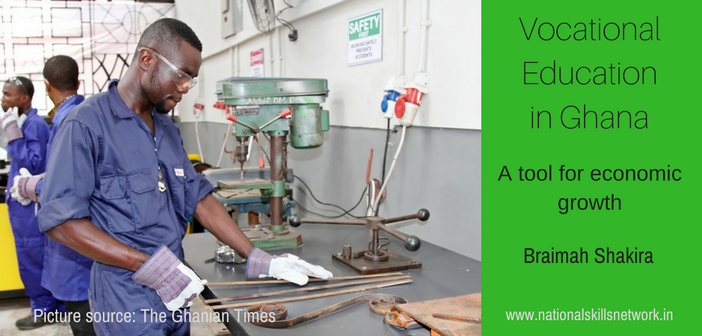This guest article by Braimah Shakira gives us a perspective on vocational education (TVET) in Ghana. Shakira is from Ghana, West Africa, currently studying Business Administration at St Mary’s College, Hyderabad under a full-time scholarship from the Indian Council for Cultural Relations (ICCR). TVET in Ghana is coordinated by Council for Technical and Vocational Education and Training (COTVET), a national body set up by an Act of Parliament of the Republic of Ghana.
Growing up, I was taught to follow passion before fashion. Have you ever spoken to a person whose childhood dreams grew smoothly into a career? Did you come across a girl who always enjoyed helping her mom to sell different commodities in the mini-market and later pursued a career as a sales manager. Or the dexterous boy who trains at the soccer field and naturally becomes a footballer by profession? Now let us face the reality, for most of us this does not happen.
We look up to our role models and their career choices yet we still debate on what exactly we want to do when we get older. We get older and still do not what we want to do. Could it be that we set unrealistic goals? Or pressure from family and society? Whatever could be the reason, as socially oriented living beings, we are extremely prone to the ideas, opinions and doubts of the people we are surrounded with plus we personally do not know what we like. We close our eyes to our capabilities but open them so wide to our weaknesses. How depressing it is!
One of the ways to live comfortably in society is through education. With knowledge and skills gained, we have been able to improve our health, economy, environment, technology and our standard of living.
 The need to identify and nurture inborn talent
The need to identify and nurture inborn talent
However, in most developing countries like India, Ghana, Congo just to mention but a few, the education system focuses on passing with distinctions on every subject. You can imagine what this unhealthy competition brings. We forget to accept the fact that, every child is born differently with unique abilities coupled with different level of Intelligent Quotient (IQ). Would it not be great if a child is motivated to discover and develop his God-given potential rather than forcing him study something he has no interest in? Your inability to pass all your final exam paints you as “dumb” says society. How sad! “I really want to go to a vocational institute but my parents would rather want me offer a professional course”. After all, it is the parents that pay the fees and provides. When would this obsolete idea vanish? We ask. Can children not give suggestion with regards to vital decisions that involves their careers especially in this era of new development.
The need to recognize vocational education as high priority
It is clear that the world needs skilled workforce in years to come and to occupy these job roles, there is a demand for goal oriented , relevant and vocational training. Yes, it is a prerequisite for economic development. Sadly in developing countries, vocational education is of low quality and hardly recognized. It is not well suited to meet the needs of the country. This has resulted in massive unemployment among the youth. This goes on to explain that vocational training is as important as any other education hence the government should dig deep into it. Braimah Shakira
Vocational education (TVET) in Ghana
Education is a pivot to Ghana’s socio-economic development. Vocational education was central to this realization since the colonial era. The purpose was to train and equip young men and women with the skills needed to satisfy the country’s work force as well as being self-employed. Examples of such training given were carpentry, masonry, needlework etc to become skilled craft men and responsible citizens. Sadly, it was not structured to solve Ghana’s socio-economic problems but were rather geared to address the British socio-economic issues as they were our colonial masters. As a result, this form of education could not provide the needed skills for the country’s betterment making people draw away from it.
But the educational system in Ghana has now undergone a paradigm shift and vocational education is so much needed for the economy. This sector of education does attract a lot of young people. However, it continues to be restrained by a lot of negative perception such as, the students failing to make the grades into the university, it’s of low quality (devalued), and of low social status. Interestingly with all these negative perceptions, it hasn’t hindered young Ghanaians from acquiring the skills they need to enter into the labor market. About 40% of high school graduates enroll in polytechnics and other vocational institutions.
What the government is doing to address this situation
- Introducing vocational education in primary schools to equip the students with practical knowledge as well as allowing them explore their hidden talents
- The government continues to provide vocational institutions with facilities and other materials needed to make the course more classroom friendly.
- They also give training to a lot of technical and vocational teachers.
- There are polytechnics built all over the 10 regions in Ghana
What can be done to rectify the imbalance
Also in developing countries most graduates from the universities do not have the requisite skills. How then do they fit in the job market? This clearly points out the significance of vocational education in the country. The government and other private institutes need to establish more vocational training centers to meet the demands of our modern age labor sector.
Furthermore, the education system should be examined regularly by being flexible and also understanding that each student has a distinct potential which needs to be recognized. It will interest you to know that in developed countries, for example Germany, over 60% of the student population enrolls in vocational institutions for higher education.
In a nutshell, as much as the economy needs engineers, lawyers, doctor’s teachers and so on it equally needs graphic designers, electricians, contractors etc. The General Secretary of the United Nations (U.N) Ban ki-moon still needs someone to work on the United Nations website, he still needs someone to work on his vehicle, above all he needs someone to help with sound –check of the gadgets in the general assembly before any gathering or meeting would be held successfully. The global world is not all about academia but the technical/ vocational education counts a lot.. Children should be helped to develop their skills and perceptions about vocational education should change to a positive one. Let us take a cue from the Australian utilization of vocational education or how Germany and Switzerland have made it a part of regular education and schooling.













